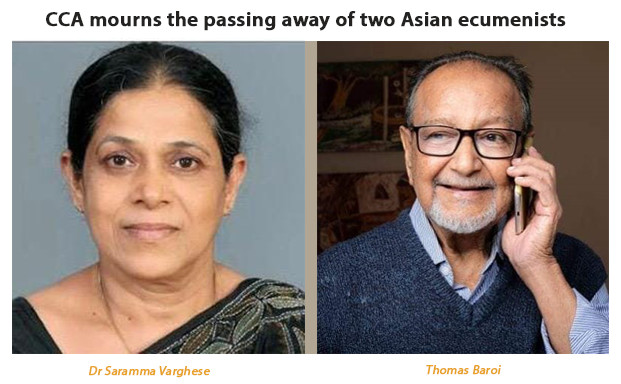CCA mourns the passing away of two Asian ecumenists

The Christian Conference of Asia (CCA) mourns the passing away of two prominent Asian ecumenists, Thomas Baroi (Bangladesh Baptist Church Sangha) and Dr Saramma Varghese (Malankara Orthodox Syrian Church in India). Both entered into eternal rest on Sunday, 22 March 2020 after battling illnesses for over a year.
Dr Saramma Varghese (64) served as the President of the All India Council of Christian Women (AICCW), the broad network of church women in action under the National Council of Churches in India (NCCI) for five years. She was a professor and head of the Department of English Language and Literature of the Catholicate College under the Mahatma Gandhi University in Kerala, India, and subsequently became Principal of the college. She was deeply committed and actively contributed to the church and ecumenical movement in India.
Dr Saramma Varghese was an active leader in the Malankara Orthodox Syrian Church’s women’s wing. She was also a member of the Executive Committee of NCCI and its other sub-committees. She participated in various international women’s conferences in Asia, Europe, and Latin America as well as the 10th Assembly of the World Council of Churches (WCC) in South Korea (2013), and the 14th General Assembly of CCA in Indonesia (2015). She is survived by her husband, well-known architect KJ Peter, and their two children.
Thomas Baroi (77), a committed Christian and ecumenical leader in Bangladesh was the Chairman of the Christian Commission for Development in Bangladesh (CCDB), the largest Christian Diakonal mission organisation of Bangladesh churches. He also served as the Director of the Ecumenical Charitable Trust (ECT) for many years. Starting his career as a civil servant of the undivided Pakistan government in erstwhile East Pakistan as well as in West Pakistan, Thomas Baroi served the church and society in Bangladesh ever since the country became independent. He was closely associated with the diakonal ministry of the Bangladesh Baptist Church Sangha as well as the National Council of Churches in Bangladesh (NCCB).
Thomas Baroi participated in various programmes of the CCA and the WCC, including a series of regional consultations organised by CCA in the 1990s on Freedom of Religion and Religious Minorities in Asia, study projects initiated by the WCC Asia Desk on Christian Marriage Laws and Discrimination of Religious Minorities in South Asia (2003–2006), the CCA’s General Assembly in Malaysia (2010), and the Asia Mission Conference (2017) in Myanmar. He is survived by his wife Manju Baroi, who was a member of the CCA Presidium, and their three children.
While expressing his condolences and sympathy on the demise of the two prominent Asian ecumenists, the CCA General Secretary Dr Mathews George Chunakara recollected his long-time associations and opportunities of working with both Thomas Baroi and Dr Saramma Varghese over several years.
The CCA General Secretary said, “Widely recognised as a refined person with humility, integrity, and academic acumen, Dr Saramma Varghese influenced generations of her students and young Christian women in India. She was admired for her leadership qualities as well as her passion for gender justice in church and society. Many young women in the Indian ecumenical movement looked up to Dr Saramma as a mentor.”
Dr Mathews George Chunakara stated, “Thomas Baroi, who was loved and respected by friends and colleagues across Bangladesh, contributed immensely and selflessly to both church and society and strengthened ecumenism at the grassroots in his country. He worked closely with some of the pioneers and eminent ecumenical leaders of the newly-independent nation who were committed to serving the Christian minority community in an Islamic majority nation.”
The CCA General Secretary further added, “The attitudes towards life and witness of both Dr Saramma Varghese and Thomas Baroi, especially their simplicity and unassuming nature in their dealings and manners, will be ever-fondly remembered by all those who interacted with them within their own countries, as well as in other parts of the world.”
The funeral of Thomas Baroi was held in the capital city of Dhaka in Bangladesh on Sunday, 22 March 2020. The funeral of Dr Saramma Varghese will be held later in her hometown Thumpamon in Kerala state, India.










